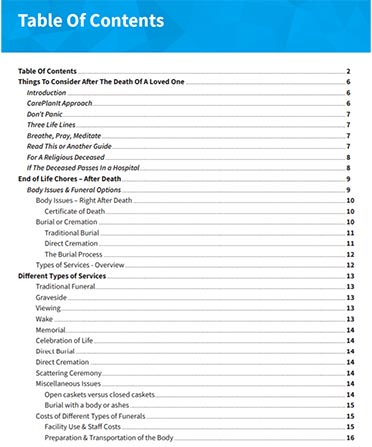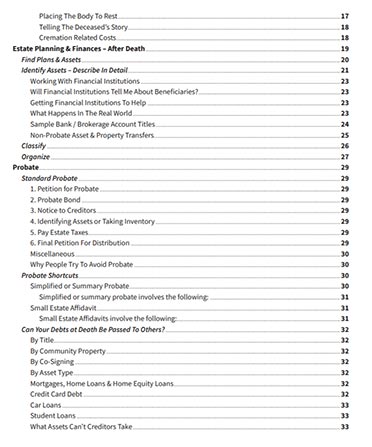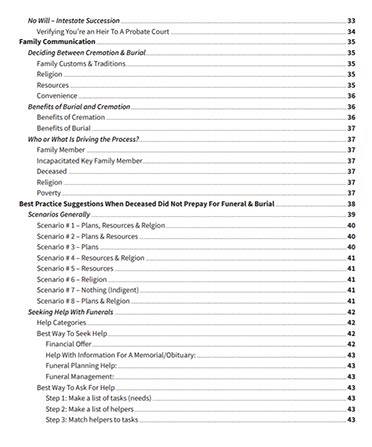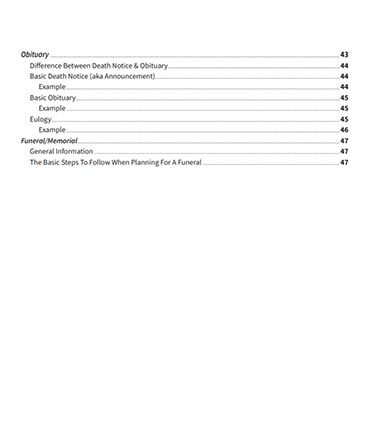Carmen and I prepared the information below for those who find a loved one deceased and without plans. It’s an emergency guide for family members who want or have to deal with a family member after death issues.
This is an abridged version. In our premium content section you can get our What To Do When A Family Member Dies With No Will & No Plans – Emergency Field Guide. Below is our premium version Table of Contents.
Don’t Panic
Read the information in this guide. It will make you knowledgeable about your options. But keep in mind that help is available. The three lifelines below can quickly get you support. They can provide immediate advice, direction, and services.
Three Life Lines
Social Workers: If the passing happened in a hospital or under hospice, ask to speak to their social worker knowledgeable in end-of-life issues. They’ll have lists of funeral home directors, crematoriums, counselors, religious cemeteries, and religious leaders willing to help.
Religious Leaders: If you or the deceased is religious, call the local priest or pastor. It doesn’t matter If you’re from a different city or that the deceased hasn’t recently been to Church. You can look up the name of a local Church or Synagogue and call. Explain your situation; in most cases, they will help or refer you to someone that can.
Local Funeral Directors: Call a local funeral director and ask for help. That’s what they do.
Breathe, Pray, Meditate
Most people experience stress, anxiety, and trauma after a loved one’s death. For many, it leads to confusion and paralysis. Even for the most emotionally stout, we’re likely to lose focus and have memory lapses. It’s called brain fog.
Sometimes you’re called to take responsibility for a family member you didn’t love. Perhaps an estranged parent or alcoholic sibling. The situation is similar, but your grief may be rooted more in anger and frustration.
You’d think recognizing our pain, loss or frustration triggers an empathetic response that we can use to focus our energies. This seldom happens.
Breathe, pray, meditate.
It’s essential to recognize the passing and allow the immediacy to roll over you. You need to breathe, pray, and meditate. Spend an hour of quiet time. This can help minimize, or anticipate, the emotional pain you’ll be facing. If you’re religious, read your religion’s prayer for the dead.
A little bit of time will allow you a better chance at rationally and calmly addressing the bureaucratic things you need to do over the next few weeks. Also, catch yourself. Your loved one’s family and friends are all grieving. If you’re a Type A (take charge kind of person) be careful about creating stress on those around you and those you may ask for help. Likewise, if you’re not good with organization and details, be cautious that you don’t send people in circles or ask them to complete unnecessary tasks.
Types of Services – Overview
There are many types of service options. Many of them are in the diagram below. Carmen and I have organized them between formality and informality and large groups or small families.
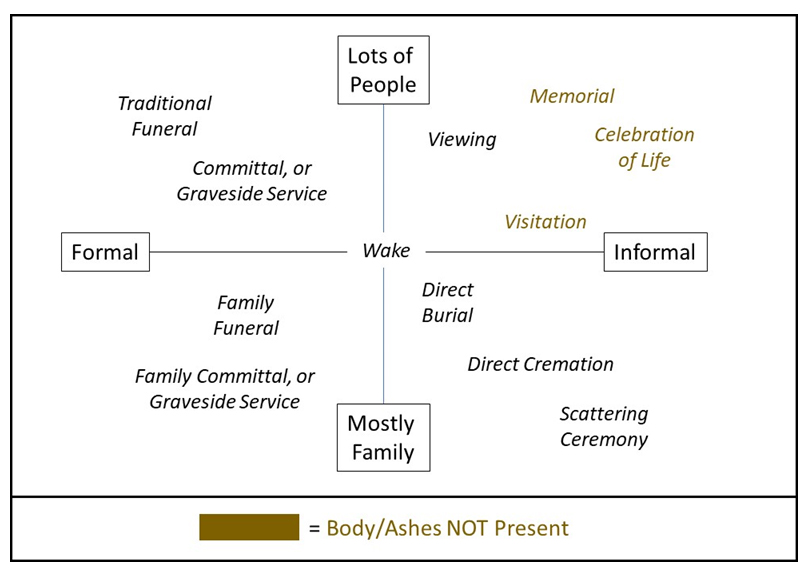
See our What To Do When A Family Member Dies With No Will & No Plans – Emergency Field Guide for detailed information on different types of funeral services.
Estate Planning & Finances – After Death
If the deceased has failed to do estate planning or plan well, you’ll find yourself scrambling to figure out what to do.
A deceased that planned has done the following:
- Appointed an executor of their estate
- Made a list of assets (i.e., location, how titled, etc.)
- Explained how they want to distribute assets after death
They, usually with the help of an estate planning attorney (or online resource) use the following types of documents and declarations to make the above a reality.
- Wills
- Trusts
- Payable on death (POD) beneficiaries,
- Rights of survivorship, and
- Declaring beneficiaries on insurance plans
These documents, declarations, and elections allow a deceased’s assets to pass to their descendants, often outside of the court process known as probate. If your loved one used any of these, you’ll need to find them.
When the deceased has plans, you (as a relative) can call up their lawyer and quickly discover who the estate’s executor is and what comes next. If you don’t know the deceased’s lawyer, you can call up other relatives and ask who the executor is and ask them what comes next.
For information about finances, see the Finance Section on CarePlanIt.com. For information about estate planning and funerals, see the End of Life Chores Section on CarePlanIt.com.
So what happens if you don’t know what the deceased has done, and you call other relatives, and they don’t know either?
In other words, what happens if a loved one dies and no one knows what they’ve done?
However, if you pass and haven’t planned, your heirs are left to pick up the pieces.
You and other family members must find any plan and the deceased’s assets.
Carmen and I describe how to do this below.
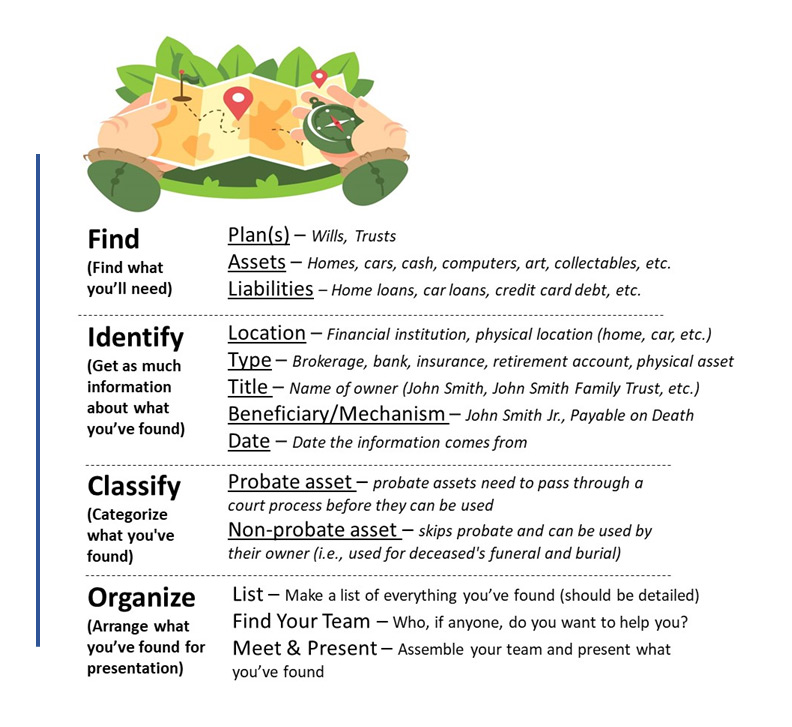
See our What To Do When A Family Member Dies With No Will & No Plans – Emergency Field Guide for detailed information on what to look for, where to find it and how to categorize and organize what you find..
Probate
Probate is the legal process that distributes a deceased’s estate to heirs. The process involves paying the debts of the deceased and settling their assets. If the deceased has estate plans, these plans are followed. If not, the deceased has died intestate, and the state distributes the deceased assets. See Intestate under the Finance Section. Finally, almost every state has shortcuts for “small estates,” sometimes called “probate shortcuts.”
Standard Probate
Every state has its own probate laws. Always consult with an estate lawyer in your state. However, most follow a similar process. Here’s what generally happens.
1. Petition for Probate
The probate process starts when a petition is filed with the probate court. The petition is usually filed by the executor named in the deceased’s estate planning document (e.g., will, trust, etc.) or a lawyer hired by the named executor. A relative or creditor of the deceased may file the petition (or their lawyer) in an intestate situation. The court then appoints an executor (aka administrator or personal representative).
2. Probate Bond
Probate bonds are surety bonds that protect heirs from harm due to executor malfeasance. In other words, the bond protects the deceased heirs from the bad acts of whoever administers the estate. The probate judge sets the bond amount.
3. Notice to Creditors
Once the court names an executor, they need to give notice to creditors. The notification process varies by state, but generally, a notice includes (1) publication in a newspaper, and (2) letters to known creditors.
4. Identifying Assets or Taking Inventory
The executor needs to identify all assets and get proof of ownership. We discuss assets in detail in our Identify Section above. The court-appointed executor has powers to compel a financial institution to release asset information. Relatives of the deceased can also provide the executor with information concerning assets. This can expedite and help the executor track down assets. However, it’s always wise to check with an attorney before volunteering information to the executor.
5. Pay Estate Taxes
The executor needs to file any necessary personal or business tax returns of the deceased and pay owed amounts. This executor needs to complete this task before the executor can distribute estate assets.
6. Final Petition For Distribution
Once the above tasks are complete, the executor can distribute the remaining estate to heirs.
Simplified or Summary Probate
Every state has a form of simplified probate. The criteria relate to the size of the estate and often the claims of creditors. Trying to push a small estate through a costly and timely standard probate process makes little sense. Nor does pushing an estate through probate where the claims of creditors exceed the value of the estate. In both cases, the people claiming assets or potentially inheriting assets would see their share greatly diminished by probate costs. In short, summary probate shortens the time for probate for small estates.
Small Estate Affidavit
Small estate affidavits (aka Voluntary Administration or Affidavit In Lieu of Administration) are essentially designed to replace a will and a probate proceeding when the deceased has a small estate, uncontested assets, and a clear heir or heirs. Under these circumstances, the heir can file an affidavit with a court (it varies by state, but it usually does not have to be the probate court) with jurisdiction based on where the deceased died and where the property requested is located. Some states even allow the affidavit to be presented to a financial institution if the heir is seeking ownership of a bank or brokerage account.
No Will – Intestate Succession
Dying without a will is common. Studies show that as many as 50% of Americans die without one. If your loved one died without a Will, their probate assets pass by what’s called intestate succession. The State determines how your assets are passed to your heirs. States decide on their own intestate succession rules. But most roughly follow the Uniform Probate Code (UPC).
Before we discuss what happens when the state disperses your funds, make sure you’ve read about Probate Shortcuts above.
The chart below shows a simplified version of the UPC. Your state probably follows something similar to what’s described.
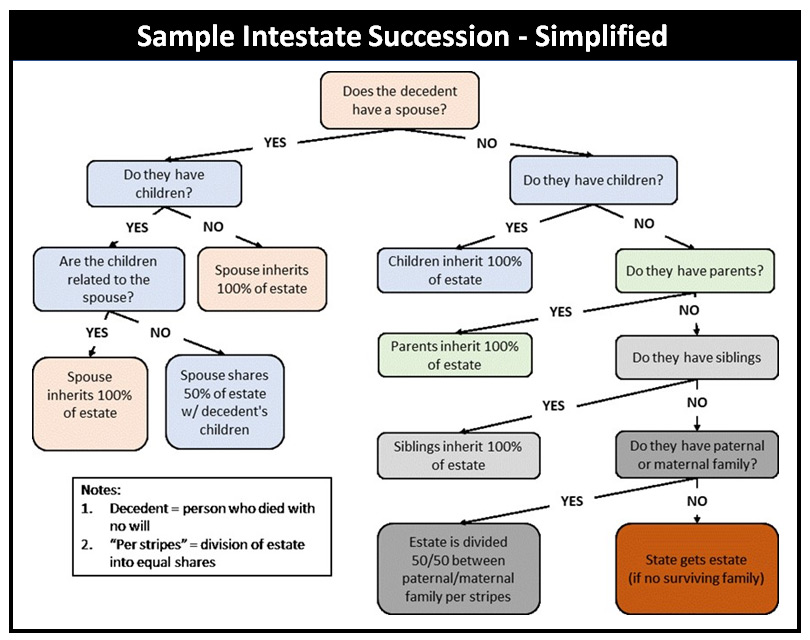
The Basic Steps To Follow When Planning For A Funeral
Finally, Carmen and I want to share what most people do to plan the funeral. Obviously, the information above helps you understand options and make decisions. But once you know what you want to do, you need to do it. That’s described in the list below.
- Follow the deceased wishes, if available
- If body or organ donation was pre-planned follow directives
- The hospital, hospice, coroner, or morgue will know what to do
- Determine what type of funeral, memorial, burial, cremation, or combination is desired
- Contact funeral homes, cemeteries, or locations for a memorial service to compare options (amenities, price, availability, etc.)
- Select your facility(s) and type of service (you may initially just conform the basics like time and type of service)
- If the deceased was a Veteran, he or she can usually be buried in a national cemetery for free, depending on the nature of his discharge and the duration of his service.
- If buried somewhere else, benefits may be available (i.e., for the funeral and burial).
- The deceased may also be eligible for additional benefits from Veterans Affairs such as a ceremonial American flag, headstone and presidential memorial certificate.
- For details, contact Veterans Affairs at 1-800-827-1000 or at: http://www.cem.va.gov/bbene/benvba.asp
- Contact friends and family who need to be informed about the death and services
- Publish a death notification and obituary
- Write an obituary and publish online or through a newspaper
- Include information about memorial gifts if appropriate
- Obituaries tend to focus on the deceased
- Death notices focus on basics and family relations (and are often combined with the obituary)
- Finalize #5 above
- Order your print package if desired
- Ask the funeral director, cemetery director or crematoria manager to help you get at least 10 certified copies of the death certificate, or contact the County Clerk’s office yourself to get them
- Have someone at your house during the funeral if possible, since burglars read obituaries and funeral notices to target empty homes.
- Allow family to assist with food preparation, housekeeping tasks, and care for young children if needed.
- Set up a system to keep track of those that helped and later acknowledge with cards, letters, phone calls, etc.
- Funeral and burials are very stressful and it is easy to forget the basics
- Parking – is it available, where is it, overflow options
- Assign someone to manage attendees and their logistics questions
- Food – can it be served, are their storage or preparation options, etc.
- Audio capabilities – will people be able to hear the service
- Are microphones needed
- Who will provide the equipment & check that its operational
- Video recording – live streaming – are their capabilities or the desire to record and broadcast the service and burial? These need to be set up and coordinated in advance.
- Do permissions need to be obtained?
- Can cameras be set up to limit who is videoed?
- Who will provide the equipment & check that its operational
- Parking – is it available, where is it, overflow options
